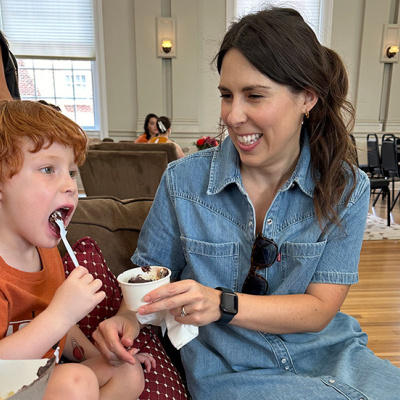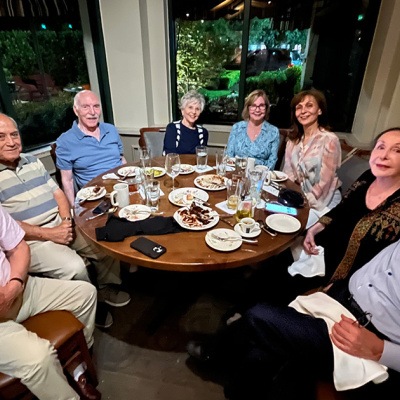Longhorn Brené Brown Is Leading a Self-Help Revolution
Best-selling author and social scientist Brené Brown is a self-described authentic mess—and her fans love her for it.

As she stood backstage waiting to kick off Houston’s inaugural TEDx Conference—an international ideas-sharing event—Brené Brown was thinking about tying up the loose ends of her 10-year-old daughter’s first-ever coed birthday party. She knew the intricate details of her research inside and out, collected from thousands of stories on the importance of human connection, elements of which she’d be sharing in a talk titled “The Power of Vulnerability,” along with her personal struggle in coming to accept the truths revealed in her decades of work—that vulnerability is courage, not weakness. It never crossed her mind that her presentation would be filmed, let alone seen by anyone beyond the 500 Houstonians from different industries who’d filled the University of Houston’s Wortham Theater Center that June day in 2010.
A longtime professor and researcher at the University of Houston Graduate College of Social Work, the then-44-year-old Brown, BA ’95, had presented such data to a crowd many times before. So it was easy to be somewhat nonchalant, a bit business-as-usual as she waited in the wings. And yet, once she took the stage, something special seemed to happen.
“When she started speaking, it was just electric,” remembers Javier Fadul, the chief innovation officer for HTX Labs, which organized the event. “I could feel how everyone in the room was hanging onto her every word.”
Still, Brown herself had little idea of the power of what she delivered that day. After she finished her 20-minute talk, she made her way back to her Houston home, hosted her daughter’s birthday festivities in the family’s front yard, and told her husband that the talk felt awkward and difficult, since she had spoken so much about her personal life. She was relieved no one would ever see it.
Life went on as usual. Brown continued to teach her courses and conduct her research. But four months later, on Oct. 6, 2010, TEDx posted her talk to its YouTube channel and it quickly went viral. Soon, everything changed. She went from referring to herself as “a girl with a book and a blog” to being invited for interviews on multiple major broadcast and cable news outlets, talk shows, and radio programs. “I was shocked. I thought about breaking in and getting the tape … I mean, it’s not like my sister and I haven’t broken in and pulled a few answering machine tapes back in the old days,” she says, before bursting into an energetic laugh, which she does often and freely in the sitting room of her expansive Houston office near River Oaks.
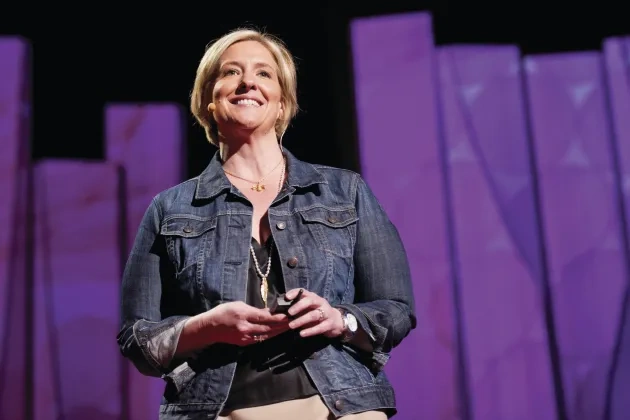
Eight years after that first TED Talk—which has been viewed more than 35 million times and is one of the top-five most-viewed TED Talks of all time—she’s become a self-help phenomenon, with four New York Times best-selling books and hundreds of speeches and interviews under her belt. Her next book to come out after the talk, Daring Greatly, quickly soared to the top of the NYT list, her speaking events started selling out within minutes of being announced, and then came Oprah, who invited her as a guest for several of OWN Network’s Super Soul Sunday episodes and a Lifeclass episode (she called Brown her “soul sister”).
Brown has found a niche that’s all her own, in a space that’s totally different from the self-help Texans like Dr. Phil who have gone before her. Her work is entirely research-based and focuses on difficult topics like shame, vulnerability, courage, and worthiness. She presents the findings from her data in an approachable way, sharing her own experiences as a wife, mother, friend, and teacher in her speeches. In person, Brown is funny (“I grew up in Texas, so as a kid, I wanted to be a Dallas Cowboys Cheerleader married to a quarterback, or a truck driver,” she says. “And then I found feminism and had to do a lot of healing.”); thoughtful, taking long pauses between questions to think before she answers; engaged, leaning in when she says something particularly important to her; frank, rarely breaking eye contact; and all-around charming, revealing relatable and personal anecdotes in the same special way she does onstage.
Brown was born in San Antonio in 1965 and lived there, close to her grandmother, her dad’s six siblings, and her many cousins, until her family (she’s the oldest of four) moved to New Orleans when she was two. Although she wouldn’t discover social work as a profession until decades later, even as a kid, she was known as a budding activist, someone who was unafraid to stand up and speak out when she saw something unjust. “Of course, that backfired on my parents more than once. I organized a babysitters union in fifth grade when I realized we were making less per hour than a cocktail costs,” she says. “I would also ask the servers at McDonald’s to wrap my nuggets in paper because I had read styrofoam was killing the earth.” The day after she graduated from high school, she left to go backpacking in Europe for six months. “I sat down and gave my parents a presentation about how you could travel in Europe for $1 a day,” she remembers. “It didn’t exactly work out that way!”
Brown’s path to The University of Texas, where she started in the spring of 1993, was nonlinear, and began at a time when things seemed to not be going quite as planned: her parents were going through a divorce. When she returned home from Europe, she felt drawn to Texas, where she had spent summers at her great aunt’s house on Lake Travis. UT had always loomed large for her—a Longhorn rug was a constant fixture in her childhood bedroom—but since she couldn’t get into UT, she packed up that rug and moved to San Antonio, where she enrolled at St. Mary’s University. She wasn’t sure what she wanted to do with her life. She got a job at a Spanish-speaking AT&T call center, where she worked the 4 p.m.-to-1 a.m. shift. She was promoted several times and eventually offered a managerial role that would require more full-time hours. But UT was still on her mind, so she declined the job and moved to Austin.
“I finally get to Austin and meet with someone in admissions at UT, and they are like, ‘You can’t come here. Like, what is this transcript?’” she says, admitting that the disappointment she felt over that initial reaction can still bring her to tears. “I basically had a 0.1 GPA and had stopped going to classes at St. Mary’s without formally withdrawing. When I heard, ‘You can’t come here.’ I was devastated.” So Brown got a job waiting tables at a seafood restaurant and enrolled at Austin Community College. She started meeting with a UT dean, and after each semester, she would take her 4.0 grades in to show him, and each time, he would tell her to maintain that GPA and come back the next semester.
When she was rejected after her second semester of straight As, she was heartbroken. She remembers calling her mom from a convenience store pay phone near West Campus. “I was sobbing when I told her they weren’t going to let me in. She was so mad, but she told me I had to keep going,” she says. “I am very tenacious, and I have always been a persistent person.” Finally, after that third semester of 4.0s and at age 27, she was admitted to UT as a history major.
Once she started classes, it didn’t feel like the right fit. “I just remember a lot of older white men with gray hair and high foreheads and thinking, I must be in the wrong place,” she says. On a random walk through campus one day, she got lost and stumbled into what is now the Steve Hicks School of Social Work. “There was a protest going on outside, there was a booth about AIDS awareness inside, and I was totally in awe,” she says. “I had always been an activist my whole life, and walking in there that day, I just thought, Wow, what is this place?”
After discovering the School of Social Work, Brown immediately changed majors. She couldn’t believe there was a profession that brought together so many of her passions—family systems, grief, and social justice. “I always felt on the outside of my family, and I never really had a real strong sense of belonging, and then I found this,” she says. “I immediately knew I was in the right place, and I just couldn’t believe it existed. There’s this great Howard Thurman quote: ‘Don’t ask what the world needs. Go ask what makes you come alive and go do that, because what the world needs are people who come alive.’ Social work made me feel alive.”
She did her field placement at the Austin State Hospital, where she worked with patients with severe mental illness, and then with adolescent girls at a residential treatment center in the Hill Country for two years. It was her professors in the department who made her realize what she wanted most: to teach. She also started coding qualitative data, which set her on the path toward becoming a grounded theory researcher. Looking back, everything about her finding social work made sense. “My mom raised us in a way that we don’t run away from people’s pain. I am not uncomfortable with it. I get it,” she says. “When people are hurting, I don’t see otherness, I just see all of us. If there was a funeral or someone was sick or in trouble, we’d always be the first ones there. We were taught to look people who are in pain in the eye because someday it would be us, and when you look away from someone’s pain, it makes them feel alone.”
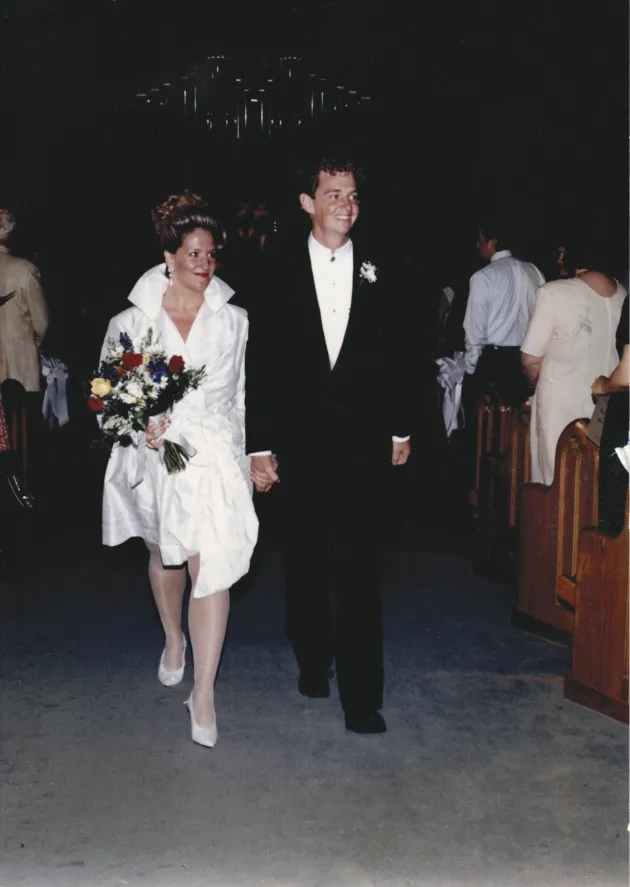
Brown spent most of her college years living with her great-aunt while working at a seafood restaurant, and she graduated from UT just before her 30th birthday. “I operate deeply from the principle, in a soulful way, that nothing is ever wasted. It wasn’t the traditional experience, but I really think all of my experiences shaped who I am. I probably learned more about people from bartending for six years. I wouldn’t change anything about my time at UT and the way that I got there.”
Charles Kiley, BA ’95, MBA ’08, Life Member, first met Brown in 1991 while they were both putting themselves through UT by waiting tables. After stints at Dell and T3, he became Brown’s CFO three years ago. From the day he met her, Kiley recognized she was special. “Brené has always been fun, smart, and witty, but balanced with a serious side as well,” he says. “Restaurant culture, at least at that time, was fairly chauvinistic, and it was not uncommon to have managers using sexually-harassing or inappropriate language even in our ‘official’ pre-shift meeting.” Once, Brown was in such a meeting, Kiley remembers. She called the manager out on the spot, then met with the general manager about it the first thing the next morning, and from that point forward that type of language was never a part of their meetings again. “It was pretty clear even back then that she was a force to be reckoned with!” Kiley says.
She chose the University of Houston for her postgraduate work because it had the only political social work specialization, and she quickly earned her master’s degree in one year, followed by her PhD over the next four. Brown has been teaching master’s- and doctoral-level social work courses at UH for the past 21 years. She has taught courses on shame and empathy, women’s issues, social welfare policy analysis, and a course on global justice with Jody Williams, who won the Nobel Peace Prize for her work on landmine removal. Brown self-published her first book, Women & Shame: Reaching Out, Speaking Truths, & Building Connection, in 2004 because she couldn’t get a literary agent. Her third book, Daring Greatly, became a No. 1 New York Times best-seller, and in 2007, Penguin bought her first book and changed the title to I Thought It Was Just Me (But It Isn’t). The Gifts of Imperfection, Rising Strong, and Braving the Wilderness have all gone on to become best-sellers.
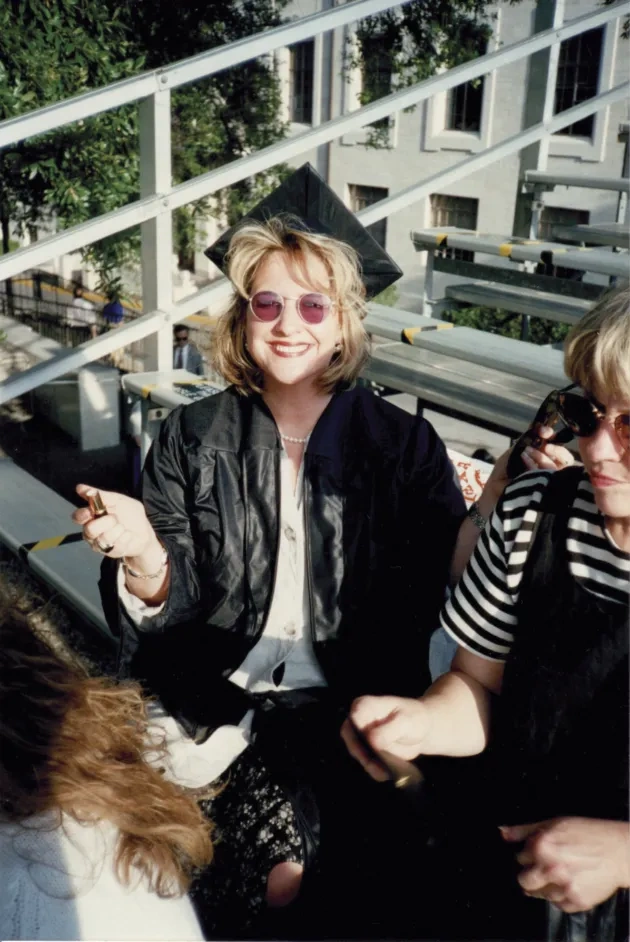
Houston is where she and her husband, Steve Alley, BA ’92, Life Member, a pediatrician, raised their two children: Ellen, now a sophomore at UT in the Plan II program, and Charlie, who is 13. “Plan II has been perfect for Ellen. She was thinking about engineering, law, or medicine, but I said, we are not paying for your tuition if you know what you want to do when you are 18,” she says. “She majors in curiosity and is exploring and taking classes in a bunch of different stuff. She has her whole life to work, and I can’t tell you the number of 20-something kids I have interviewed in medicine, law, or engineering who are doing it because it’s what their parents did and because they never explored what they loved. I didn’t want that for her.”
Brown has a great love for her hometown. “I love the diversity here. The thing about Houston that’s amazing is we build really long tables here, not walls,” she says. “If you are willing to be kind and work hard and contribute more than you criticize, there is a place for you here, no matter where you are from, no matter what you are up against. And of course, the food!” She shares a few favorite spots, like Hugo’s for brunch downtown, but she’s mostly a self-described homebody who spends her downtime playing cards or Ping-Pong (she keeps a table at the office) with the family, or at their second house, in Galveston.
Her children rarely appear on her wildly popular social media platforms, an extension of her work that she uses to communicate with her many fans and to react to events, like speaking out on gun control following the Sutherland Springs shooting. “I will share what’s vulnerable in my life, but I won’t share what’s intimate in my life,” she says. “That’s the line for me, because, if nothing else, my research has revealed to me the importance of our stories and owning our stories. I don’t want my story to overshadow their narrative for how they think about their life.”
Today, Brown’s schedule is filled with speaking engagements around the world, research as the University of Houston’s Huffington Endowed Chair, and writing, which she is doing now for her next book on courage and leadership, Dare to Lead: Brave Work. Tough Conversations. Whole Hearts, which is due out on Oct. 9. “In the beginning, I remember all the attention and interest being fairly discombobulating for Brené, who, I think people would be surprised to learn, is very much an introvert,” Kiley says. “If she could spread this work effectively without having to be on so many planes and stages and screens, I’m sure she would. But she is very committed to doing what serves the work, and she is willing to do what it takes to share her research with the world in a way that has real and lasting impact.”
As she continues to scale her work globally, it’s not getting to meet one of her heroes, the late Maya Angelou; guest preaching at the Washington National Chapel; seeing Reese Witherspoon post a photo of the cover of one her books with a glowing review; or taping a segment for the Ellen Show with actress Kristen Bell that are the surreal moments. It’s things like when one of her summer interns recently told her that she took a course based on her work at the McCombs School of Business last semester. There are more than 100,000 teachers and counselors in 50 organizations who have completed her courses.
“When I’m standing backstage and I hear the person introducing me saying, ‘The author of four No. 1 New York Times best-selling books,’ I still catch myself thinking, Who are they talking about?” she says.
Brown is thinking about focusing on emotions for her next research endeavor, which will no doubt lead to another book, and about possibly writing a children’s book. What topic she is going to focus on next usually finds her, even if the idea seems daunting at first, and she pushes it away for a while before coming back to it. “My commitment to working in leadership is really in work, because we spend half of our lives at work. I don’t think you can change the world unless you change the way we work, and I think big changes are coming that are going to require us to be more human, less armored, more authentic,” she says. “I think when we talk about the rise of machine learning and artificial intelligence, the things we will never be able to replace are human skills of courage and empathy. So we better get good at them because we aren’t great at them now.”
Her life’s work has become offering the rest of us a roadmap for how to live, and the responsibility of how many people look to her for advice these days doesn’t intimidate her. “I have never positioned myself as an expert on anything more than that I am an authentic mess. I am imperfect, but I keep showing up and trying to learn and do the best I can,” she says. “I will just try to keep making connections between what seems unconnected and give people accessible language to understand what we all experience—and that makes people feel less alone.”
CREDITS: From top, Matt Wright-Steel; James Duncan Davidson; courtesy of Brené Brown (2)
An earlier version of this article stated that 100,000 people are certified to teach her work; 100,000 people have taken Brown's courses. It also referred to Brown's research work as ground and theory. The correct term is "grounded theory."

